Evaluating Climate Change Impact on Accommodation Industry Businesses
VerifiedAdded on 2022/09/12
|6
|1345
|67
Essay
AI Summary
This essay evaluates the impact of climate change on the accommodation sector, focusing on its implications for businesses. It highlights how extreme weather conditions and rising sea levels, driven by climate change, are affecting tourism patterns and reducing visitor numbers in popular destinations like Venice and Australia. The essay analyzes the challenges faced by the accommodation industry, including the need to reduce carbon emissions and implement sustainability measures. It examines the efforts of leading brands like Hilton, Marriott, and Hyatt in adopting corporate social responsibility (CSR) initiatives and aligning with UN Sustainable Development Goals. The essay concludes by emphasizing the importance of both national and international measures to mitigate the negative impacts of climate change on the accommodation sector and ensure its sustainable growth, using examples and references to support its findings.
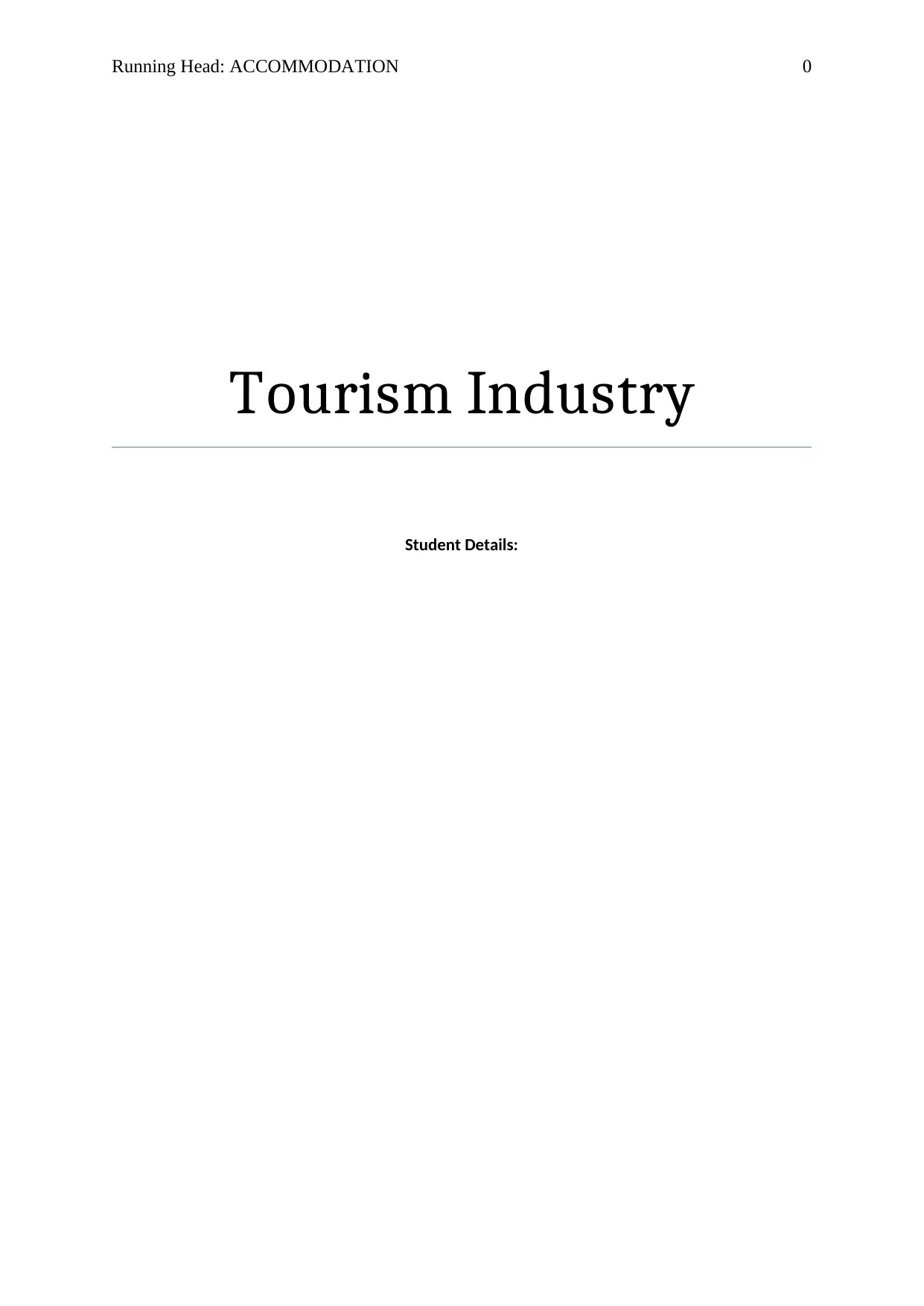
Running Head: ACCOMMODATION 0
Tourism Industry
Student Details:
Tourism Industry
Student Details:
Paraphrase This Document
Need a fresh take? Get an instant paraphrase of this document with our AI Paraphraser
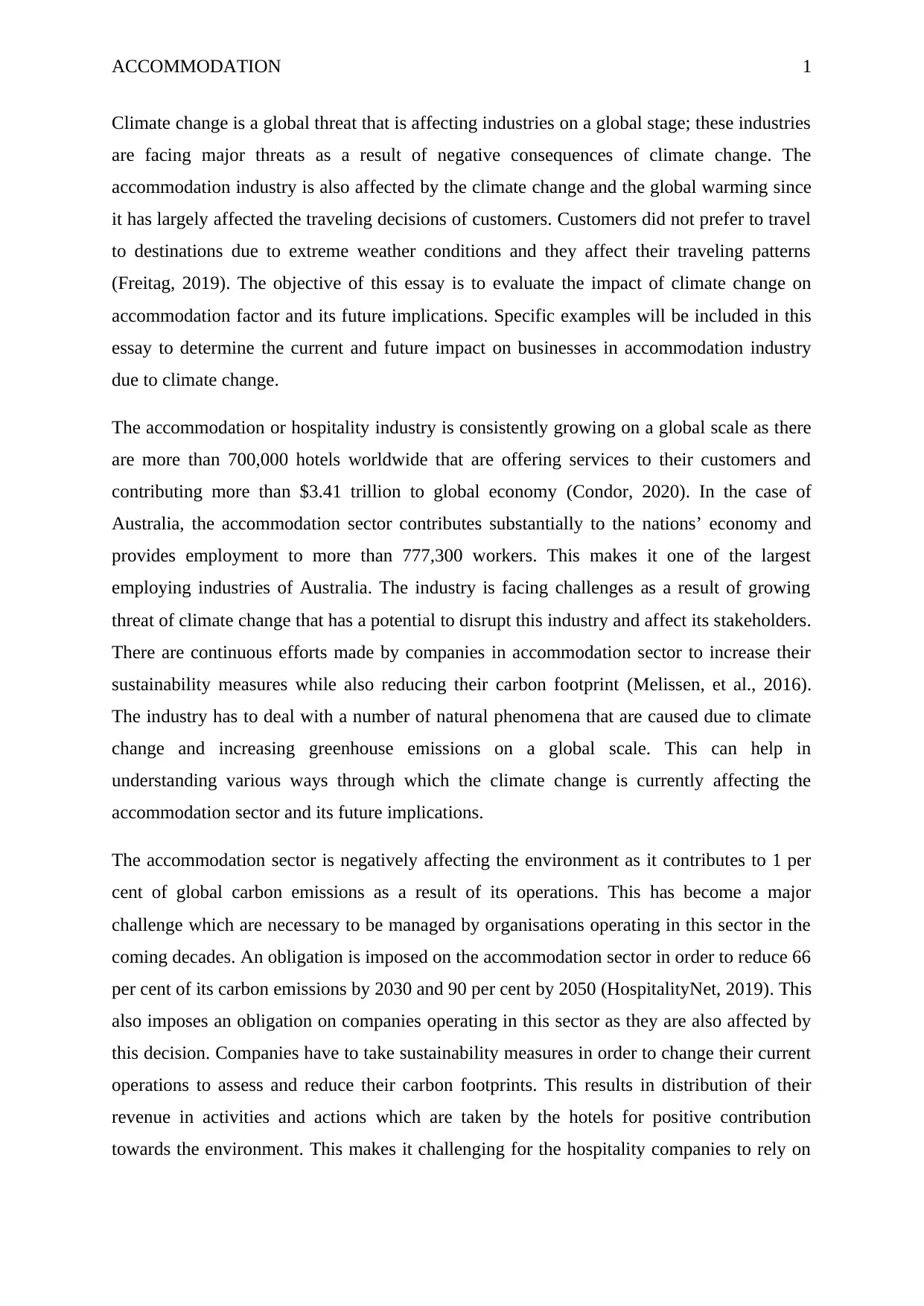
ACCOMMODATION 1
Climate change is a global threat that is affecting industries on a global stage; these industries
are facing major threats as a result of negative consequences of climate change. The
accommodation industry is also affected by the climate change and the global warming since
it has largely affected the traveling decisions of customers. Customers did not prefer to travel
to destinations due to extreme weather conditions and they affect their traveling patterns
(Freitag, 2019). The objective of this essay is to evaluate the impact of climate change on
accommodation factor and its future implications. Specific examples will be included in this
essay to determine the current and future impact on businesses in accommodation industry
due to climate change.
The accommodation or hospitality industry is consistently growing on a global scale as there
are more than 700,000 hotels worldwide that are offering services to their customers and
contributing more than $3.41 trillion to global economy (Condor, 2020). In the case of
Australia, the accommodation sector contributes substantially to the nations’ economy and
provides employment to more than 777,300 workers. This makes it one of the largest
employing industries of Australia. The industry is facing challenges as a result of growing
threat of climate change that has a potential to disrupt this industry and affect its stakeholders.
There are continuous efforts made by companies in accommodation sector to increase their
sustainability measures while also reducing their carbon footprint (Melissen, et al., 2016).
The industry has to deal with a number of natural phenomena that are caused due to climate
change and increasing greenhouse emissions on a global scale. This can help in
understanding various ways through which the climate change is currently affecting the
accommodation sector and its future implications.
The accommodation sector is negatively affecting the environment as it contributes to 1 per
cent of global carbon emissions as a result of its operations. This has become a major
challenge which are necessary to be managed by organisations operating in this sector in the
coming decades. An obligation is imposed on the accommodation sector in order to reduce 66
per cent of its carbon emissions by 2030 and 90 per cent by 2050 (HospitalityNet, 2019). This
also imposes an obligation on companies operating in this sector as they are also affected by
this decision. Companies have to take sustainability measures in order to change their current
operations to assess and reduce their carbon footprints. This results in distribution of their
revenue in activities and actions which are taken by the hotels for positive contribution
towards the environment. This makes it challenging for the hospitality companies to rely on
Climate change is a global threat that is affecting industries on a global stage; these industries
are facing major threats as a result of negative consequences of climate change. The
accommodation industry is also affected by the climate change and the global warming since
it has largely affected the traveling decisions of customers. Customers did not prefer to travel
to destinations due to extreme weather conditions and they affect their traveling patterns
(Freitag, 2019). The objective of this essay is to evaluate the impact of climate change on
accommodation factor and its future implications. Specific examples will be included in this
essay to determine the current and future impact on businesses in accommodation industry
due to climate change.
The accommodation or hospitality industry is consistently growing on a global scale as there
are more than 700,000 hotels worldwide that are offering services to their customers and
contributing more than $3.41 trillion to global economy (Condor, 2020). In the case of
Australia, the accommodation sector contributes substantially to the nations’ economy and
provides employment to more than 777,300 workers. This makes it one of the largest
employing industries of Australia. The industry is facing challenges as a result of growing
threat of climate change that has a potential to disrupt this industry and affect its stakeholders.
There are continuous efforts made by companies in accommodation sector to increase their
sustainability measures while also reducing their carbon footprint (Melissen, et al., 2016).
The industry has to deal with a number of natural phenomena that are caused due to climate
change and increasing greenhouse emissions on a global scale. This can help in
understanding various ways through which the climate change is currently affecting the
accommodation sector and its future implications.
The accommodation sector is negatively affecting the environment as it contributes to 1 per
cent of global carbon emissions as a result of its operations. This has become a major
challenge which are necessary to be managed by organisations operating in this sector in the
coming decades. An obligation is imposed on the accommodation sector in order to reduce 66
per cent of its carbon emissions by 2030 and 90 per cent by 2050 (HospitalityNet, 2019). This
also imposes an obligation on companies operating in this sector as they are also affected by
this decision. Companies have to take sustainability measures in order to change their current
operations to assess and reduce their carbon footprints. This results in distribution of their
revenue in activities and actions which are taken by the hotels for positive contribution
towards the environment. This makes it challenging for the hospitality companies to rely on
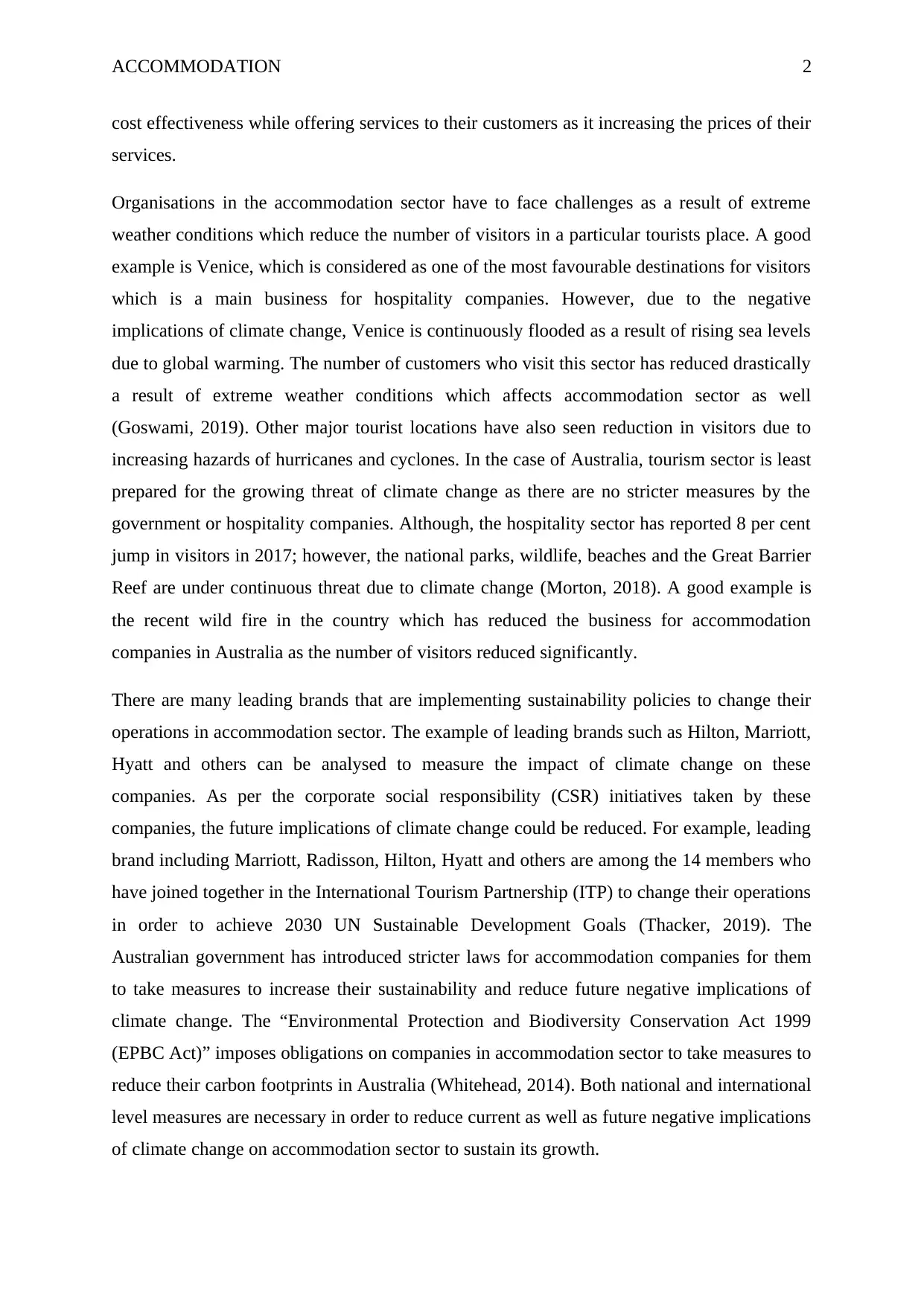
ACCOMMODATION 2
cost effectiveness while offering services to their customers as it increasing the prices of their
services.
Organisations in the accommodation sector have to face challenges as a result of extreme
weather conditions which reduce the number of visitors in a particular tourists place. A good
example is Venice, which is considered as one of the most favourable destinations for visitors
which is a main business for hospitality companies. However, due to the negative
implications of climate change, Venice is continuously flooded as a result of rising sea levels
due to global warming. The number of customers who visit this sector has reduced drastically
a result of extreme weather conditions which affects accommodation sector as well
(Goswami, 2019). Other major tourist locations have also seen reduction in visitors due to
increasing hazards of hurricanes and cyclones. In the case of Australia, tourism sector is least
prepared for the growing threat of climate change as there are no stricter measures by the
government or hospitality companies. Although, the hospitality sector has reported 8 per cent
jump in visitors in 2017; however, the national parks, wildlife, beaches and the Great Barrier
Reef are under continuous threat due to climate change (Morton, 2018). A good example is
the recent wild fire in the country which has reduced the business for accommodation
companies in Australia as the number of visitors reduced significantly.
There are many leading brands that are implementing sustainability policies to change their
operations in accommodation sector. The example of leading brands such as Hilton, Marriott,
Hyatt and others can be analysed to measure the impact of climate change on these
companies. As per the corporate social responsibility (CSR) initiatives taken by these
companies, the future implications of climate change could be reduced. For example, leading
brand including Marriott, Radisson, Hilton, Hyatt and others are among the 14 members who
have joined together in the International Tourism Partnership (ITP) to change their operations
in order to achieve 2030 UN Sustainable Development Goals (Thacker, 2019). The
Australian government has introduced stricter laws for accommodation companies for them
to take measures to increase their sustainability and reduce future negative implications of
climate change. The “Environmental Protection and Biodiversity Conservation Act 1999
(EPBC Act)” imposes obligations on companies in accommodation sector to take measures to
reduce their carbon footprints in Australia (Whitehead, 2014). Both national and international
level measures are necessary in order to reduce current as well as future negative implications
of climate change on accommodation sector to sustain its growth.
cost effectiveness while offering services to their customers as it increasing the prices of their
services.
Organisations in the accommodation sector have to face challenges as a result of extreme
weather conditions which reduce the number of visitors in a particular tourists place. A good
example is Venice, which is considered as one of the most favourable destinations for visitors
which is a main business for hospitality companies. However, due to the negative
implications of climate change, Venice is continuously flooded as a result of rising sea levels
due to global warming. The number of customers who visit this sector has reduced drastically
a result of extreme weather conditions which affects accommodation sector as well
(Goswami, 2019). Other major tourist locations have also seen reduction in visitors due to
increasing hazards of hurricanes and cyclones. In the case of Australia, tourism sector is least
prepared for the growing threat of climate change as there are no stricter measures by the
government or hospitality companies. Although, the hospitality sector has reported 8 per cent
jump in visitors in 2017; however, the national parks, wildlife, beaches and the Great Barrier
Reef are under continuous threat due to climate change (Morton, 2018). A good example is
the recent wild fire in the country which has reduced the business for accommodation
companies in Australia as the number of visitors reduced significantly.
There are many leading brands that are implementing sustainability policies to change their
operations in accommodation sector. The example of leading brands such as Hilton, Marriott,
Hyatt and others can be analysed to measure the impact of climate change on these
companies. As per the corporate social responsibility (CSR) initiatives taken by these
companies, the future implications of climate change could be reduced. For example, leading
brand including Marriott, Radisson, Hilton, Hyatt and others are among the 14 members who
have joined together in the International Tourism Partnership (ITP) to change their operations
in order to achieve 2030 UN Sustainable Development Goals (Thacker, 2019). The
Australian government has introduced stricter laws for accommodation companies for them
to take measures to increase their sustainability and reduce future negative implications of
climate change. The “Environmental Protection and Biodiversity Conservation Act 1999
(EPBC Act)” imposes obligations on companies in accommodation sector to take measures to
reduce their carbon footprints in Australia (Whitehead, 2014). Both national and international
level measures are necessary in order to reduce current as well as future negative implications
of climate change on accommodation sector to sustain its growth.
⊘ This is a preview!⊘
Do you want full access?
Subscribe today to unlock all pages.

Trusted by 1+ million students worldwide
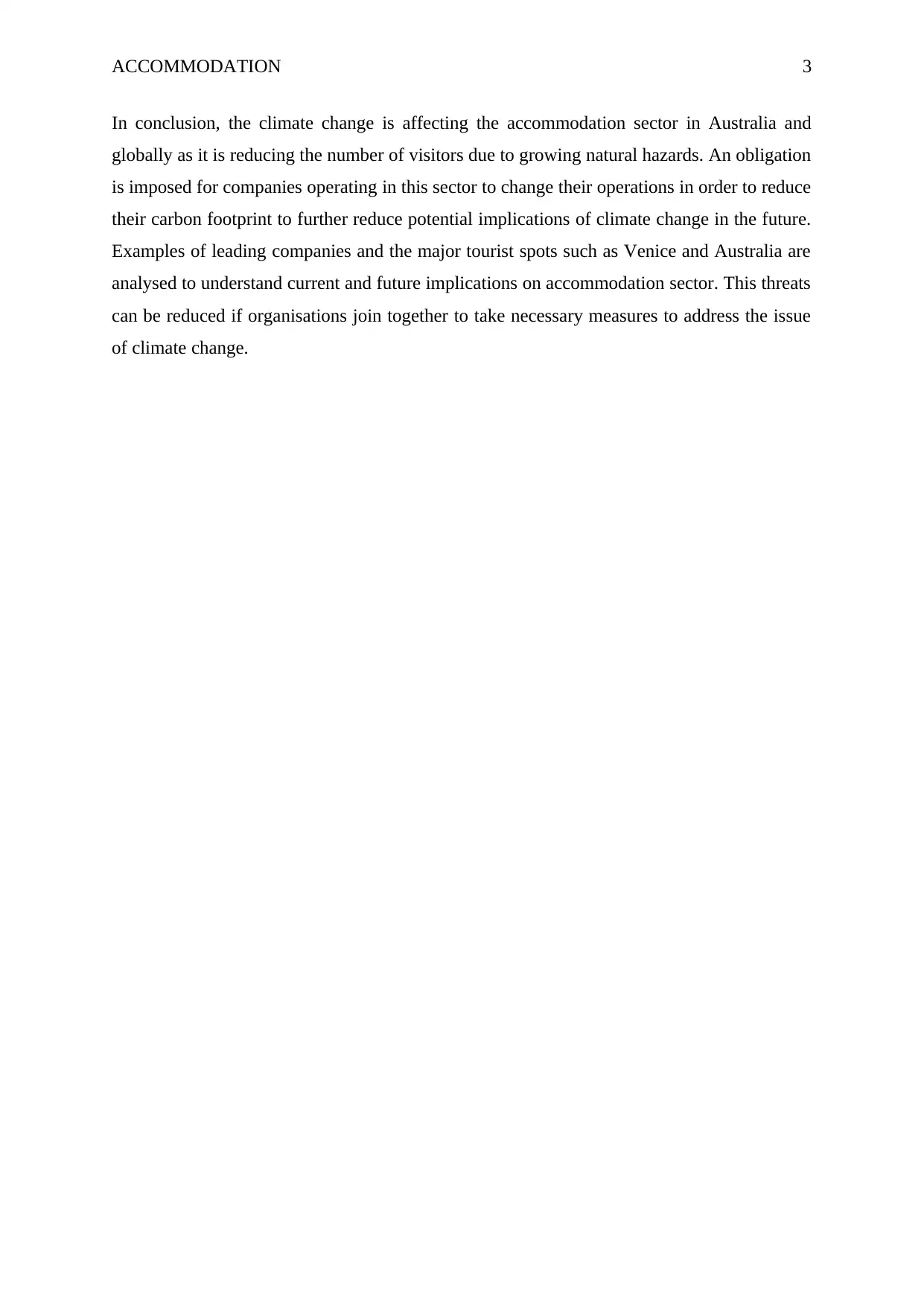
ACCOMMODATION 3
In conclusion, the climate change is affecting the accommodation sector in Australia and
globally as it is reducing the number of visitors due to growing natural hazards. An obligation
is imposed for companies operating in this sector to change their operations in order to reduce
their carbon footprint to further reduce potential implications of climate change in the future.
Examples of leading companies and the major tourist spots such as Venice and Australia are
analysed to understand current and future implications on accommodation sector. This threats
can be reduced if organisations join together to take necessary measures to address the issue
of climate change.
In conclusion, the climate change is affecting the accommodation sector in Australia and
globally as it is reducing the number of visitors due to growing natural hazards. An obligation
is imposed for companies operating in this sector to change their operations in order to reduce
their carbon footprint to further reduce potential implications of climate change in the future.
Examples of leading companies and the major tourist spots such as Venice and Australia are
analysed to understand current and future implications on accommodation sector. This threats
can be reduced if organisations join together to take necessary measures to address the issue
of climate change.
Paraphrase This Document
Need a fresh take? Get an instant paraphrase of this document with our AI Paraphraser
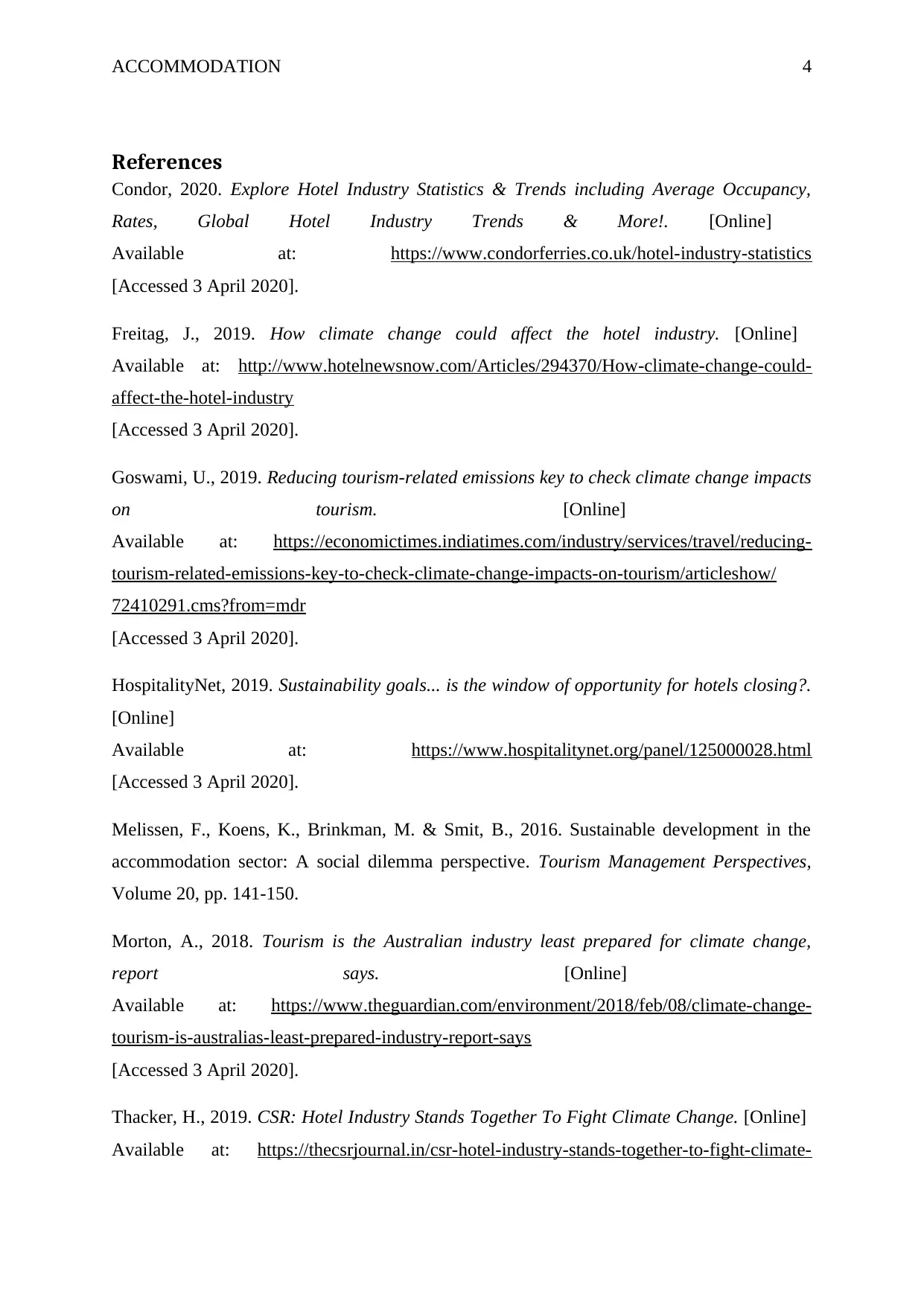
ACCOMMODATION 4
References
Condor, 2020. Explore Hotel Industry Statistics & Trends including Average Occupancy,
Rates, Global Hotel Industry Trends & More!. [Online]
Available at: https://www.condorferries.co.uk/hotel-industry-statistics
[Accessed 3 April 2020].
Freitag, J., 2019. How climate change could affect the hotel industry. [Online]
Available at: http://www.hotelnewsnow.com/Articles/294370/How-climate-change-could-
affect-the-hotel-industry
[Accessed 3 April 2020].
Goswami, U., 2019. Reducing tourism-related emissions key to check climate change impacts
on tourism. [Online]
Available at: https://economictimes.indiatimes.com/industry/services/travel/reducing-
tourism-related-emissions-key-to-check-climate-change-impacts-on-tourism/articleshow/
72410291.cms?from=mdr
[Accessed 3 April 2020].
HospitalityNet, 2019. Sustainability goals... is the window of opportunity for hotels closing?.
[Online]
Available at: https://www.hospitalitynet.org/panel/125000028.html
[Accessed 3 April 2020].
Melissen, F., Koens, K., Brinkman, M. & Smit, B., 2016. Sustainable development in the
accommodation sector: A social dilemma perspective. Tourism Management Perspectives,
Volume 20, pp. 141-150.
Morton, A., 2018. Tourism is the Australian industry least prepared for climate change,
report says. [Online]
Available at: https://www.theguardian.com/environment/2018/feb/08/climate-change-
tourism-is-australias-least-prepared-industry-report-says
[Accessed 3 April 2020].
Thacker, H., 2019. CSR: Hotel Industry Stands Together To Fight Climate Change. [Online]
Available at: https://thecsrjournal.in/csr-hotel-industry-stands-together-to-fight-climate-
References
Condor, 2020. Explore Hotel Industry Statistics & Trends including Average Occupancy,
Rates, Global Hotel Industry Trends & More!. [Online]
Available at: https://www.condorferries.co.uk/hotel-industry-statistics
[Accessed 3 April 2020].
Freitag, J., 2019. How climate change could affect the hotel industry. [Online]
Available at: http://www.hotelnewsnow.com/Articles/294370/How-climate-change-could-
affect-the-hotel-industry
[Accessed 3 April 2020].
Goswami, U., 2019. Reducing tourism-related emissions key to check climate change impacts
on tourism. [Online]
Available at: https://economictimes.indiatimes.com/industry/services/travel/reducing-
tourism-related-emissions-key-to-check-climate-change-impacts-on-tourism/articleshow/
72410291.cms?from=mdr
[Accessed 3 April 2020].
HospitalityNet, 2019. Sustainability goals... is the window of opportunity for hotels closing?.
[Online]
Available at: https://www.hospitalitynet.org/panel/125000028.html
[Accessed 3 April 2020].
Melissen, F., Koens, K., Brinkman, M. & Smit, B., 2016. Sustainable development in the
accommodation sector: A social dilemma perspective. Tourism Management Perspectives,
Volume 20, pp. 141-150.
Morton, A., 2018. Tourism is the Australian industry least prepared for climate change,
report says. [Online]
Available at: https://www.theguardian.com/environment/2018/feb/08/climate-change-
tourism-is-australias-least-prepared-industry-report-says
[Accessed 3 April 2020].
Thacker, H., 2019. CSR: Hotel Industry Stands Together To Fight Climate Change. [Online]
Available at: https://thecsrjournal.in/csr-hotel-industry-stands-together-to-fight-climate-
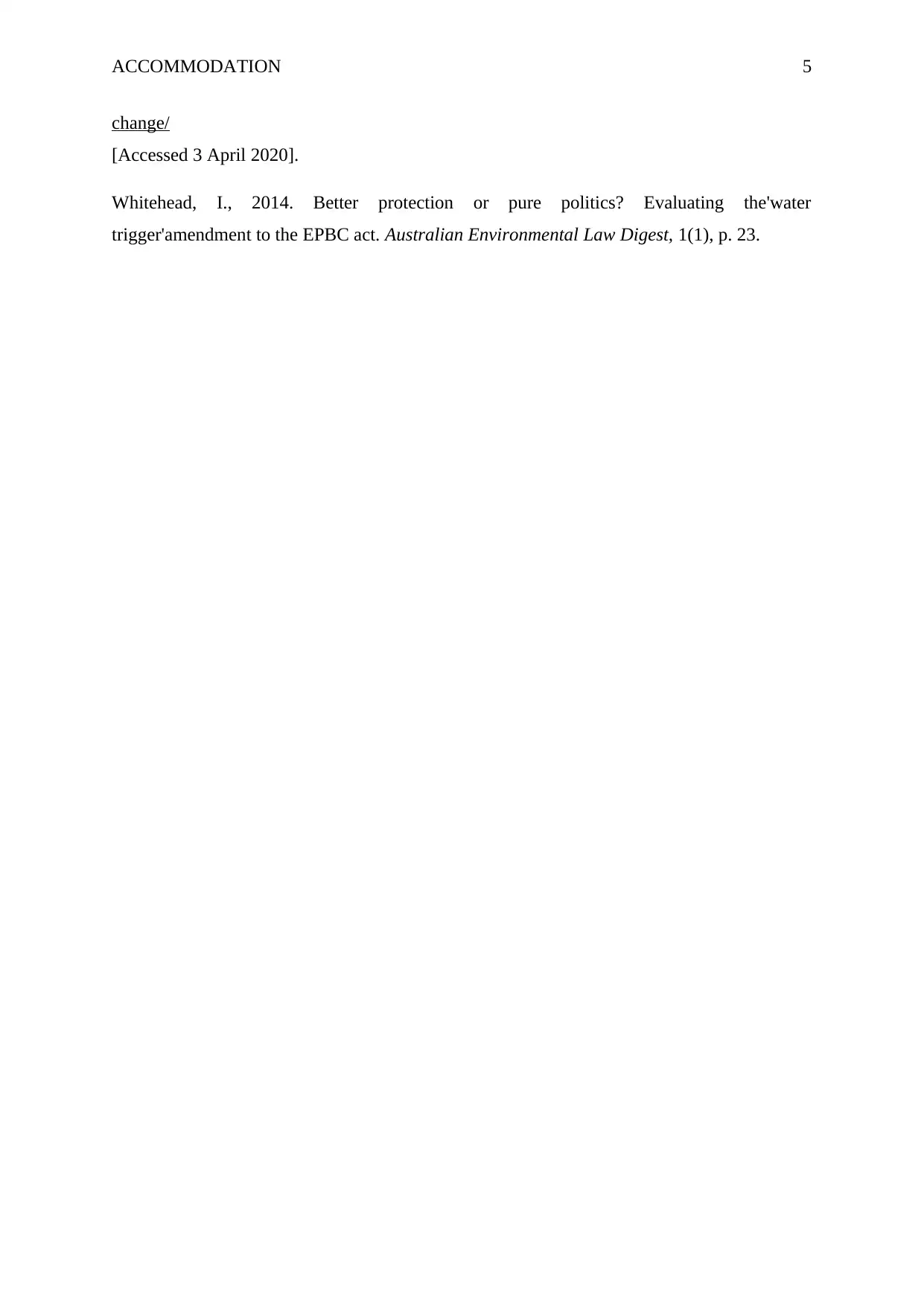
ACCOMMODATION 5
change/
[Accessed 3 April 2020].
Whitehead, I., 2014. Better protection or pure politics? Evaluating the'water
trigger'amendment to the EPBC act. Australian Environmental Law Digest, 1(1), p. 23.
change/
[Accessed 3 April 2020].
Whitehead, I., 2014. Better protection or pure politics? Evaluating the'water
trigger'amendment to the EPBC act. Australian Environmental Law Digest, 1(1), p. 23.
⊘ This is a preview!⊘
Do you want full access?
Subscribe today to unlock all pages.

Trusted by 1+ million students worldwide
1 out of 6
Related Documents
Your All-in-One AI-Powered Toolkit for Academic Success.
+13062052269
info@desklib.com
Available 24*7 on WhatsApp / Email
![[object Object]](/_next/static/media/star-bottom.7253800d.svg)
Unlock your academic potential
Copyright © 2020–2026 A2Z Services. All Rights Reserved. Developed and managed by ZUCOL.



